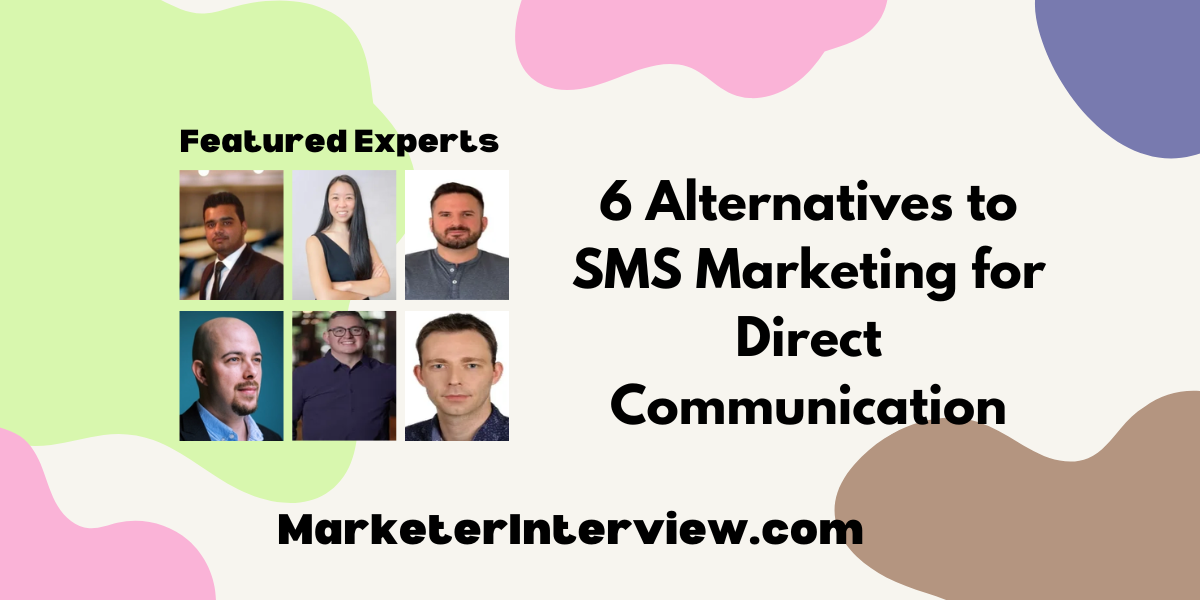6 Alternatives to SMS Marketing for Direct Communication
To explore effective alternatives to SMS marketing for direct communication, we asked CEOs and digital marketing directors for their expert opinions. From using social media direct messages to utilizing in-app messaging, here are six specific alternatives these leaders recommend and their reasoning behind each one.
Want to get quoted in MarketerInterview.com content just like this? Apply to become a contributor today!
Contents
Use Social Media Direct Messages
People already spend a lot of time on social networking sites, so using DMs to reach them works. When companies deliver customer service through social media platforms such as Facebook, X, and Instagram, they provide speed and efficiency. After all, many customers feel that the most crucial aspect of effective customer service is prompt resolution of issues.

Rebecca Xing, CEO, Trustana
Leverage WhatsApp for Business
A great alternative to SMS marketing is using WhatsApp for Business. It’s cost-effective, and in many countries, it’s more widely used than traditional SMS. People are increasingly accustomed to being contacted on WhatsApp, making it an ideal platform for direct communication.
To maximize your outreach, there are many tools that let you use the WhatsApp API to send messages in bulk, streamlining your communication efforts. Additionally, WhatsApp for Business integrates seamlessly with popular CRMs like HubSpot, ActiveCampaign, and Salesforce, allowing you to manage your customer interactions more effectively.
For the best results, make sure your audience is subscribed to your communications, knows your company, and expects outreach. This approach ensures your messages are welcomed rather than ignored, helping you maintain a positive relationship with your customers while leveraging a platform they’re already comfortable with.

Jonathan Buffard, Digital Marketing Director, Bottom Line Marketing Agency
Implement Push Notifications
One specific alternative to SMS marketing for direct communication is the use of push notifications via mobile apps. Push notifications offer a direct line of communication to users who have installed your app, and they can be highly effective in engaging customers with timely and relevant messages.
Push notifications have several advantages over SMS marketing. First, they are generally less intrusive than SMS messages, as users have opted in to receive notifications by downloading your app. This means they are more likely to be receptive to your messages. Additionally, push notifications can be highly personalized and targeted based on user behavior, location, and preferences, allowing for more relevant and engaging content.
Another key benefit of push notifications is that they can include rich media such as images, videos, and interactive elements, which can enhance the user experience and drive higher engagement rates compared to plain-text SMS messages. Furthermore, push notifications are cost-effective, as they do not incur the per-message costs associated with SMS marketing, making them a scalable option for businesses of all sizes.
However, it’s important to note that the success of push notifications relies heavily on the quality of your app and the value it provides to users. To maximize the effectiveness of push notifications, it’s crucial to ensure that your app offers a compelling user experience and that notifications are used strategically to add value rather than overwhelm users.
In summary, push notifications serve as a powerful alternative to SMS marketing, offering a more personalized, cost-effective, and engaging way to communicate directly with your audience.

John Reinesch, Founder, John Reinesch Consulting
Send Email Newsletters
Email newsletters are a solid alternative to SMS marketing for direct communication. Unlike texts, emails allow you to share more detailed information. Providing value through content helps build trust. Imagine sending a weekly newsletter with legal tips, updates on laws, or case studies. Your subscribers not only get helpful content but also start seeing you as an expert in your field.
Using tools like Mailchimp or Constant Contact, you can easily segment your audience. This ensures personalized communication, which increases engagement. For instance, sending tailored content about personal-injury law to those who’ve shown interest amplifies your relevance. And remember, catchy subject lines and engaging visuals in your emails can make all the difference in capturing attention.

Casey Meraz, Owner & Digital Marketing Expert, Casey Meraz
Adopt Rich Communication Services
One specific alternative to SMS marketing is Rich Communication Services. RCS is an advanced messaging protocol designed to enhance the traditional texting experience by supporting rich media, such as images, videos, and audio, and offers features like read receipts, typing indicators, and group chats. This makes it more engaging and interactive.
The thing I love most about RCS is that businesses can verify their identity within the messaging interface. This helps build trust with recipients and reduces the chances of messages being flagged as spam. Additionally, it allows for interactive elements, such as quick-reply buttons and action buttons, which can streamline customer interactions and enhance the user experience.
It also works through the default messaging app on most modern smartphones, so users don’t need to download additional apps to receive messages. If a user’s device doesn’t support RCS, the message automatically defaults to SMS, ensuring that communication is still delivered. In a nutshell, RCS’s unique capabilities make it a compelling alternative for businesses looking to improve their direct communication efforts.

Peter Bryla, Senior Community Manager, LiveCareer
Utilize In-App Messaging
One specific alternative to SMS marketing for direct communication is in-app messaging. Unlike SMS, which reaches users through their mobile phone’s text message system, in-app messaging appears directly within an app that the user is already engaged with.
In-app messaging allows for a more interactive and personalized communication experience. You can tailor messages based on user behavior within the app, such as sending tips on using features they haven’t explored yet or notifying them about new content or promotions relevant to their interests.
Additionally, because users are already using the app, they are more likely to see and engage with these messages. It also avoids the limitations of SMS, such as character limits and potential costs, and enables richer content like images, buttons, and links. This method helps create a more integrated and seamless communication experience, enhancing user engagement and satisfaction.

Azam Mohamed Nisamdeen, Founder, Convert Chat
Want to get quoted in MarketerInterview.com content just like this? Apply to become a contributor today!






